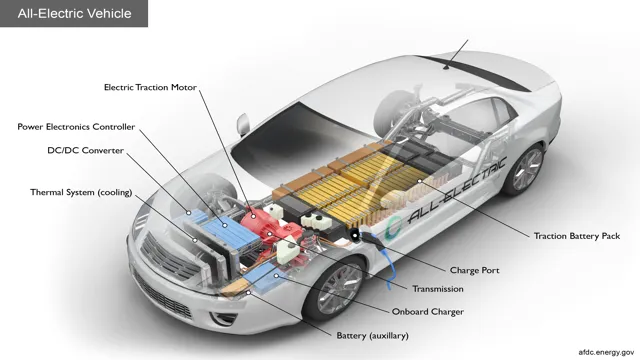Power Up Your Career with Electrical Engineering Technology: A Guide to a High-Voltage Profession
Electricity powers our world. It lights up our homes, runs our appliances, and fuels our technologies. But have you ever wondered who designs and maintains the electrical systems that make all this possible? That’s where electrical engineering technology comes in.
With a career in this field, you can play a crucial role in ensuring that everything from power grids to communication networks runs smoothly. But what exactly does electrical engineering technology entail? And what kind of career opportunities are available? Put simply, electrical engineering technology is the practical application of electrical principles in real-world scenarios. A degree in this field covers topics such as circuit analysis, control systems, and digital electronics.
Graduates of electrical engineering technology programs can go on to work in a variety of industries, including manufacturing, telecommunications, and renewable energy. One exciting aspect of a career in electrical engineering technology is the opportunity to innovate and problem-solve. As technology advances and the demand for sustainable energy sources grows, the need for creative solutions in this field is ever-present.
Whether you want to work on designing cutting-edge smart grids or implementing sustainable energy solutions, the possibilities are endless. If you’re considering a career in electrical engineering technology, you’re in luck. The Bureau of Labor Statistics projects that employment in this field will grow by 5% between 2019 and 2029, which is faster than the average for all occupations.
This means that there will be plenty of job opportunities for those with the right skills and training. In this blog, we’ll explore the ins and outs of electrical engineering technology as a career. From the day-to-day responsibilities of the job to the education and training requirements, we’ll cover everything you need to know to decide if this field is right for you.
So let’s get started!
Overview
If you’re considering a career in engineering, then electrical engineering technology is definitely worth exploring. As an electrical engineering technologist, you’ll have a hands-on role in designing, developing, and maintaining electrical systems and equipment. This is a diverse field that offers a wide range of opportunities, from working with renewable energy sources to designing smart grids and communication networks.
One of the benefits of this career is that it’s constantly evolving and adapting to new technologies, so you’ll always be learning and growing. Additionally, with the rapid growth of the tech industry, there’s a high demand for skilled electrical engineering technologists. So if you’re looking for a challenging and rewarding career path, electrical engineering technology is a great option to consider.
What is electrical engineering technology?
Electrical engineering technology is a field that deals with applying the principles and theories of electrical engineering to practical systems and devices. Professionals in this field design, develop, and maintain various types of electrical technologies, including power systems, telecommunications equipment, and computer systems. Electrical engineering technology differs from traditional electrical engineering, as it focuses more on the practical applications of technology than the theoretical principles behind it.
This means that electrical engineering technology professionals are often more involved in the testing, operation, and maintenance of equipment and systems, as well as troubleshooting and problem-solving when technical issues arise. Overall, electrical engineering technology plays a crucial role in our modern world, ensuring the reliable and efficient operation of various electrical systems and devices that we rely on every day.

Why choose this career?
When it comes to choosing a career, there are many factors to consider. However, for those interested in pursuing a career that is rewarding and fulfilling both personally and professionally, a career in healthcare may be the right choice. Healthcare professionals play a vital role in our society, helping to promote and maintain the health and wellbeing of individuals and communities.
Not only are healthcare careers emotionally fulfilling, but they can also be financially rewarding, as the demand for healthcare professionals continues to grow. Whether you’re interested in becoming a doctor, nurse, therapist, or any other healthcare professional, you can rest assured that you will be making a positive impact on the world while making a comfortable living. So if you’re looking for a career that is both challenging and rewarding, healthcare may be the right choice for you.
Education
Electrical engineering technology is an incredibly promising career path for those with an interest in electrical systems and their applications. The job outlook for electrical engineering technicians is expected to grow due to increasing demand in areas such as renewable energy and smart grid technology. A degree in electrical engineering technology can lead to a variety of exciting opportunities, from designing and testing electrical systems to troubleshooting and repairing complex machinery.
In addition, this career path offers the chance to work with cutting-edge technology and constantly expand your skill set. If you are looking for a career with both challenges and rewards, electrical engineering technology may just be the perfect choice for you.
Degree requirements for electrical engineering technology
When it comes to pursuing a career in electrical engineering technology, a degree is often essential. The specific requirements for obtaining a degree in this field vary by institution, but generally, students must complete a mixture of core courses and electives. Core courses usually cover foundational topics such as digital design, circuits analysis, and electronic instrumentation.
Electives, on the other hand, give students the freedom to explore areas of interest, such as power systems, electronic communication, or automation control. Additionally, many programs require students to complete a capstone project or internship to gain hands-on experience before graduation. Overall, obtaining a degree in electrical engineering technology is a significant investment in time and effort, but it can open the door to a challenging and rewarding career in a rapidly evolving field.
So, if you have an interest in technology, possess an analytical mind, and want to apply your skills to real-world problems, then pursuing a degree in electrical engineering technology can be a great choice for you.
Skills required for the job
When it comes to the skills required for a job, education is often at the forefront of the conversation. Depending on the field of work, a specific level of education or type of degree may be needed. For example, a doctor is required to complete medical school and pass licensing exams.
However, not all jobs require a four-year degree or higher. Many positions allow for on-the-job training and experience in a related field. In fact, some industries place more emphasis on skills and abilities rather than formal education.
It’s important to research the specific requirements for the field you are interested in pursuing and determine what combination of education and experience is necessary to excel. Ultimately, hard work and a willingness to learn can go a long way towards achieving success in any career path.
Job Market
If you’re considering a career in electrical engineering technology, then you’re in the right field. The job market for electrical engineering technology is currently booming, with a high demand for skilled professionals in a variety of industries. From power generation to telecommunications, electrical engineers with a background in technology are needed to design, install, and maintain complex electrical systems.
Plus, with advances in renewable energy and smart grid technology, the need for professionals with expertise in these areas is only going to increase. So if you enjoy building things, solving problems, and working with technology, then a career in electrical engineering technology might be right for you. With a degree in this field, you’ll have the skills and knowledge to compete in a rapidly growing job market, and to make a positive impact on the world around you.
Job growth projections
Job growth projections are a hot topic in today’s job market. As the global economy grows and shifts, it is essential to understand what jobs will be in high demand and which ones may become redundant. One of the most promising trends in job growth is in the healthcare industry.
The aging population and advancements in medical technology have driven up the demand for healthcare jobs across the board, from nurses to physicians and even health IT specialists. Another promising sector is technology, where jobs in fields such as data science, cybersecurity, and software engineering are all expected to grow significantly over the next decade. While some jobs may become obsolete, it’s important to remain optimistic about the overall job market and the opportunities that it presents.
By exploring new technologies and industries, job seekers can position themselves for success and growth in the years to come.
Industries that hire electrical engineering technicians
If you’re looking for a career as an electrical engineering technician, there are plenty of job opportunities in various industries that require your skills. The job market for electrical engineering technicians is expected to grow over the next few years, especially in fields such as renewable energy, telecommunications, and manufacturing. As technology continues to advance, the demand for individuals with expertise in electrical systems and devices will increase.
In the renewable energy sector, electrical engineering technicians are needed to install, maintain, and repair solar panels, wind turbines, and other sustainable energy sources. Telecommunications companies require technicians to set up and maintain communication systems, while in the manufacturing industry, technicians work on the assembly and testing of electrical and electronic equipment. With the rise of automation and smart technology, there will be no shortage of job opportunities for skilled electrical engineering technicians in the near future.
Salary
When it comes to pursuing a career in electrical engineering technology, one of the biggest factors that comes into play is salary. It’s important to understand that the salary for a person in this profession will depend on various factors such as experience, geographic location, and job title. However, according to the Bureau of Labor Statistics, the median annual salary for an electrical engineering technician is $65,260.
This is a great starting point for a career and can increase substantially with more experience and additional qualifications. It’s worth noting that working in this sector can also lead to a career with great advancement opportunities and potential for increased salary and benefits. It’s important to weigh the salary and career outlook for any profession, and pursuing a career in electrical engineering technology can provide a promising path for those with the necessary skills and interest in the field.
Average salary ranges for this career
When considering a career, one of the most important factors to consider is salary. In the case of this career, the average salary ranges can vary depending on different factors such as the industry, location, and years of experience. On average, the starting salary in this field is around $40,000 per year, while with more experience and higher-level positions, the salary can increase up to $100,000 or more.
However, it’s important to note that salaries will also vary between different countries and regions. It’s recommended to research the salaries in your specific industry and location before deciding on a career path. Don’t forget to also take into account other benefits that may come with the position such as bonuses, healthcare, and retirement plans.
Overall, when considering salary, it’s essential to find a balance between the amount earned and job satisfaction. After all, our work should also bring us happiness and fulfillment, not just a paycheck.
Conclusion
In conclusion, electrical engineering technology is a career where sparks fly both literally and figuratively. From designing and implementing cutting-edge technology to troubleshooting complex systems, this field combines equal parts critical thinking and creative problem solving. With a constant need for innovation and the potential to impact countless industries, electrical engineering technology offers a career path that is both intellectually stimulating and socially meaningful.
So if you’re looking for a career that will keep you wired for success, look no further than electrical engineering technology!”
FAQs
What is electrical engineering technology?
Electrical engineering technology is a field of engineering that deals with the study and application of electrical principles for designing, developing, testing, and maintaining electrical and electronic systems.
What are the job opportunities in electrical engineering technology?
There are plenty of job opportunities in electrical engineering technology, including roles in power generation and distribution, renewable energy, telecommunications, manufacturing, and research and development.
What are the essential skills required for a career in electrical engineering technology?
Essential skills required for a career in electrical engineering technology include strong problem-solving skills, excellent analytical skills, good communication and teamwork, attention to detail, and fundamental knowledge of electrical principles.
What is the scope of electrical engineering technology as a career?
The scope of electrical engineering technology as a career is vast. It is a rapidly growing field with a high demand for skilled professionals. The future prospects include opportunities to design and develop new technologies that revolutionize the way we live, such as smart grids, renewable energy resources, and the Internet of Things (IoT).





